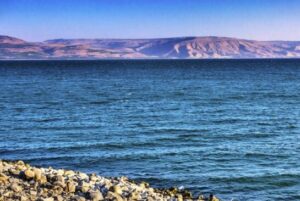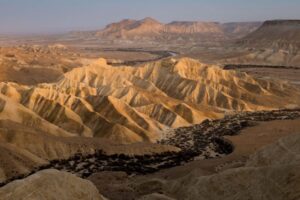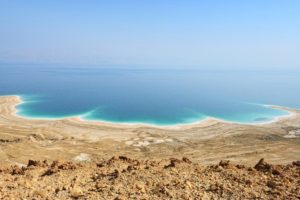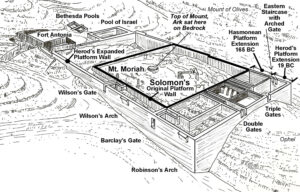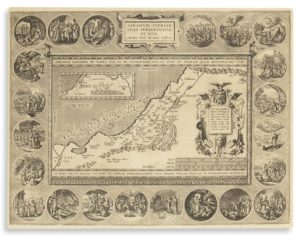Judea – the Land Promised to Abraham
Canaan, Palestine, Judaea, Judea, the land of Abraham – all refer to the same place today known as Israel.[1] Judea’s 2000-year history preceding the era of Jesus of Nazareth began with Abram who was ironically born in the land of Babylon in present day Iran, a mortal enemy of Israel.[2]
Young Abram married Sarai in Ur of the Chaldees. His father, Terah, then moved his family to Haran in the land of Canaan.[3] One day God appeared to Abram telling him to move his own family to another place that God would show him promising:[4]
Gen. 12:2 “I will make you into a great nation and I will bless you; I will make your name great, and you will be a blessing.”(NIV)
Abram and Sarai, along with nephew Lot and his family, eventually resettled near Salem. One day, an enemy raiding party captured Lot, his family and their possessions whereupon Abram took up arms and set out on a rescue mission.[6]
Victorious in battle and rescuing Lot’s family and possessions, Abram returned home to a hero’s welcome greeted by Melchizedek, priest and King of Salem. He blessed Abram in the name of the most high God, creator of the heavens and earth.[7] Soon thereafter, God promised Abram’s descendants would inherit the land although after first being enslaved in a foreign land for 400 years.[8]
Thirteen years later at the age of 99, God blessed Abram changing his name to Abraham; his wife’s name from Sarai to Sarah; promised them a son to be named Isaac; and reaffirmed His promise that Canaan would be a permanent possession.[9]
Gen. 17:8 “I will give the whole land of Canaan – the land where you are now residing to you and your descendants after you as a permanent possession. I will be their God. (NET)
Jacob, son of Isaac and Rebekah, was blessed by God changing his name to Israel and promised that his descendants would produce an assembly of nations and kings. The sons of Israel became the fathers of the tribes of Israel.[10]
Just before Jacob died, he blessed each son. To Judah, he specifically passed on the blessing of his grandfather Abraham foretelling Judah would become the father of the tribe of royalty.[11]
Events took a major detour as prophesied before God’s promise to Abraham was to be fulfilled. Jacob had a favorite son, Joseph, causing jealousy among his brothers.[12] They ambushed Joseph and sold him as a slave to a passing caravan bound for Egypt, then lied to their father saying the boy had been killed by a wild animal.[13]
Many years later during a famine in Canaan, Jacob resorted to seeking food from Egypt and eventually discovered that not only was Joseph alive, he was second in power only to Pharaoh himself![14] Under the protection of Joseph, all the sons of Israel left the land of Abraham and moved to Egypt where, over the next 400 years, they became slaves of the ruling Pharaohs.[15]
Moses was then called by God from a burning bush at the base of Mt. Sinai to lead the Hebrews on the Exodus out of Egypt. Back at Mt. Sinai after the exodus from Egypt, God gave the Law to Moses which included five big promises, all tied to God’s plans for the place in the land promised to Abraham:[16]
EX 23:20 “I am going to send an angel before you to protect you as you journey and to bring you into the place that I have prepared.”(NET)
EX 33:1-2 “Then the LORD spoke to Moses, “Depart, go up from here, you and the people whom you have brought up from the land of Egypt, to the land of which I swore to Abraham, Isaac, and Jacob, saying, ‘To your descendants I will give it.’” (NASB, NKJV)
Canaan borders, the land promised to Abraham, Isaac and Jacob, were clearly spelled out.[17] Entering the land of Abraham, the waters of the Jordan River were miraculously parted allowing the Hebrews to cross on dry ground.[18]
As part of their conquests in the land of Abraham, the new Hebrew King Davidbattled the inhabitants of Jebus, formerly known as Salem. Once David established his throne in the City of David, the city became known as Jerusalem encompassing Mt. Zion and Mt. Moriah where the Temple would eventually be built.[19]
Over the next several centuries, David’s kingdom of Israel degraded when successive kings and the Hebrews did not abide by their agreement with God’s covenant presented by Moses at Mt. Sinai. The covenant, a type of contract, had a penalty clause which was enacted by God.
Split into the kingdoms of Israel and Judah, Israel was destroyed by the Assyrians. Judah was conquered by King Nebuchadnezzar and taken away captive to Babylon.
Persia vanquished Babylon while the Hebrews were still in captivity providing the opportunity for the Hebrew wise man, Daniel, to serve kings in both Empires.[20] Under decrees by Persian Kings Cyrus, Darius and Artaxerxes, the Hebrews were allowed to return to the land of Judah and rebuild Jerusalem.[21]
Conquests of Alexander the Great expanding the Greek Empire included the land now called “Palestine.”[22] In 333 BC, Alexander’s army was met outside of Jerusalem by the Jewish High Priest Shimon HaTzaddik in a successful attempt to prevent the army’s destruction of the Jewish Temple.[23]
Jerusalem was spared and the Jews viewed Alexander as their liberators, in part, because Hellenism under the new Greek Empire allowed them religious freedom. In fact, Greek eventually became the common language in Palestine.[24]
On the stage of history, the Greek Empire was replaced by the Roman Empire and Palestine picked up a new name, Judea. Caesar Augustus and the senate allowed Judea, with Jerusalem as its capital, to be ruled by a new ruthless king named Herod.[25]
During the reign of King Herod, Jesus of Nazareth of the lineage of Abraham, Judah and King David, was born in Bethlehem. He traveled throughout Judea and Samaria teaching and healing until one day during the Passover in Jerusalem, Jesus was captured, tried and crucified.
Was it merely a coincidence that over the course of 2000 years, the land promised by God to Abraham remained until Jesus of Nazareth arrived on the scene?
Updated November 24, 2024.
This work is licensed under a Creative Commons Attribution-NonCommercial-NoDerivatives 4.0 International License.
REFERENCES:
[1] “Palestine.” Encyclopædia Britannica. 2019. <https://www.britannica.com/place/Palestine> Niese. B., ed. Flavii Iosephi opera. 1892. J. Book 5, Section 117 [AJ 5.1], footnote 1. <http://www.perseus.tufts.edu/hopper/text?doc=Perseus:text:1999.01.0146:book=5:section=1&highlight=palestine> Josephus, Flavius. Antiquities of the Jews. Book 20, Chapter 11.2.<https://books.google.com/books?id=e0dAAAAAMAAJ&printsec=frontcover&source=gbs_ge_summary_r&cad=0#v=onepage&q=Palestine&f=false>
[2] Genesis 11:31,12:1-4; 13:12-17; 15:7. “Historical Timeline.” The Biblical Zionist. BiblicalZionist.com. 2009. <http://www.biblicalzionist.com/timeline.htm> Uittenbogaard, Arie “Salem meaning | Salem etymology.” Abarim Publications. n.d. <http://www.abarim-publications.com/Meaning/Salem.html#.U5SQqCjyTih> Josephus, Flavius. Wars of the Jews. Book VI, Chapter X. <http://books.google.com/books?id=e0dAAAAAMAAJ&printsec=frontcover&source=gbs_ge_summary_r&cad=0#v=onepage&q&f=false> “Ur of the Chaldees.” Penn Museum. n.d. project. <https://www.penn.museum/sites/ur> Wooley, Leonard. “Ur of the Chaldees: a record of seven years of excavation.” Internet Archives. video. 1952. <https://archive.org/details/urofchaldeesreco00wool>
[3] Genesis 11:27-31.
[4] Genesis 12:1.
[6] Genesis 14:11-16.
[7] Genesis 14:18-20.
[8] Genesis 15.
[9] Genesis 31:1 CR. Quran. Pickthall translation. Surah 21:72. <http://www.islam101.com/quran/QTP/index.htm>
[10] Genesis 35:9-13. CR. Quran. Trans. Abdullah Yusuf Ali. 40 references to “Children of Israel.” <http://search-the-quran.com/search/Children%20of%20Israel>
[11] Genesis 49:8-10.
[12] Genesis 37:3-4; 18-28.
[13] Genesis 37:18-28.
[14] Genesis 42-46.
[15] Exodus 12:40.
[16] Exodus 19:1. Ryrie. Charles C., ed. Ryrie Study Bible. New American Standard Trans. 1978. “Laws relating to conquests, [Ex] 23:20-33.” [xvii] Joshua 15. Mark, Joshua. “Canaan.” Ancient History Encyclopedia. 2018. <https://www.ancient.eu/canaan> “Canaan.” Encyclopædia Britannica. 2019. <https://www.britannica.com/place/Canaan-historical-region-Middle-East> Jarus, Owen. “Who Were the Canaanites?” LiveScience. 2016. <https://www.livescience.com/56016-canaanites.html>
[17] Joshua 15. Giamberini, Mariasilvia; Provenzale, Antonello.
[18] Joshua 3:9-17.
[19] Samuel 5:6-9; I Chronicles 11:4-8; 2 Chronicles 3:1;
[20] Ezekiel 1:2-3.
[21] Ezekiel 6:7, 12; 7:12-13, 23, 26. Josephus. Antiquities. Book XI, Chapter V.1.
[22] “Palestine.” Encyclopædia Britannica. Maier, Paul L. The New Complete Works of Josephus. Trans. William Whiston. 1999. p 385. <http://books.google.com/books?id=kyaoIb6k2ccC&lpg=PP1&dq=the%20complete%20works%20of%20josephus&pg=PP1#v=onepage&q&f=false> Herodotus. The Histories. 440 BC. English Trans. A. D. Godley, Ed. 1920. Book 7, Chapter 89.<http://www.perseus.tufts.edu/hopper/text?doc=Perseus%3Atext%3A1999.01.0126%3Abook%3D7%3Achapter%3D89> “From Alexander the Great to ad 70 Hellenistic Greece.” Washington State University. 6 June 1999. Archived URL. Archive.org. 4 Jan. 2011. <http://web.archive.org/web/20110104072822/http://www.wsu.edu/~dee/GREECE/ALEX.HTM>
[23] “Palestine.” Encyclopædia Britannica. 2014. Spiro, Ken. “History Crash Course #27: The Greek Empire.” Aish.com. 2001. <http://www.aish.com/jl/h/cc/48939587.html> Hooker, Richard. “Hellenistic Greece: Alexander the Great.” Washington State University. 1999. <http://web.archive.org/web/20110104072822/http://www.wsu.edu/~dee/GREECE/ALEX.HTM>
[24] “Hellenism.” Jewish Encyclopedia. 2011. <http://jewishencyclopedia.com/articles/7535-hellenism> Josephus. Antiquities. Book XII, Chapter II.1.
[25] Maier. The New Complete Works of Josephus. p 491. “Actium (31BCE).” Livius.org. Ed. Jona Lendering. 2019. <https://www.livius.org/articles/battle/actium-31-bce/> Josephus. Antiquities. Book XV, Chapters V-VI; Book XVII, Chapter VIII.1. “Herod the Great.” Livius.org. Ed. Jona Lendering. <http://www.livius.org/articles/person/herod-the-great/?> Villalba i Varneda, Pere. The Historical Method of Flavius Josephus. p 14. <http://books.google.com/books?id=kdUUAAAAIAAJ&lpg=PA14&ots=2ek7SgCy2c&dq=josephus%2C%20battle%20of%20actium%2C%20herod&pg=PA14#v=onepage&q=josephus,%20battle%20of%20actium,%20herod&f=false> “Negev Desert.” EGU Blogs. image. 2018. <https://blogs.egu.eu/geolog/tag/negev-desert> Turnage, Marc. CBN Israel. “Biblical Israel: Dead Sea.”image. 2021. <https://cbnisrael.org/2021/04/06/biblical-israel-dead-sea> Amir, Rebecca Stadlen. Israel21c. “10 spectacular photos of sunsets in Israel.” image. <https://www.israel21c.org/10-spectacular-photos-of-sunsets-in-israel> “Nahariya Beaches – Northern Israel.” Visions of Travel. image. 2020. <https://www.visionsoftravel.org/nahariya-beaches-northern-israel> “Israel, The Jordan River Near Tel Dan.” Sonia Halliday Photo Library.image. 2010. <http://www.soniahalliday.com/category-view3.php?pri=IS19A-13-21.jpg> “The Jordan River.” Good Shepherd Travels. image. n.d. <https://www.tourtheholylands.com/holy-land-tour-locations/holy-land-tours/the-jordan-river-7-stories-of-feet-and-an-ax-head> “Sea of Galilee Is Almost Full, But Its Beaches Remain Empty.” World Israel News. Image. 2000.https://worldisraelnews.com/sea-of-galilee-is-almost-full-but-its-beaches-remain-empty/>
